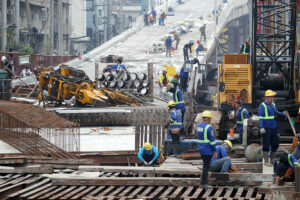
NCR building materials wholesale price growth flat in February amid easing in retail index
PRICE GROWTH of construction materials in the National Capital Region (NCR) was flat at the wholesale level, while retail price growth eased in February, the Philippine Statistics Authority (PSA) said on Tuesday.
Citing preliminary data, the PSA said the April construction materials wholesale price index (CMWPI) remained at 2%, same as the January reading but much lower than the 9.1% posted a year earlier.
In the first two months, the CMWPI averaged 2%, far behind the 11.4% year-earlier pace.
Of the 17 categories of commodity, price growth increased in four while nine commodities posted declines while growth in four was unchanged.
Driving the CMWPI was G.I. sheets, which posted price growth of 5.0%, up from 4.5% in January, plumbing materials (1.5% from 1%), fuels and lubricants (1.5% from 0.3%), and tileworks (0.6% from -0.3%).
Categories where price growth slowed were hardware (5.3% from 5.6%); painting works (4.9% from 5%); electrical works (3.8% from 4.5%); plywood (3.1% from 3.8%); lumber (2.2% from 2.3%); plumbing fixtures and accessories or waterworks (1.7% from 4.1%); sand and gravel (1.3% from 1.5%); concrete products and cement (1.1% from 1.8%); and PVC pipes (0.3% from 1.0%).
The indices for doors, jambs, and steel casements, asphalt, machinery and equipment rental and glass and glass products were flat at 2.8%, 0%, 0% and 0.1%, respectively.
In a separate report, the PSA said retail price growth in construction materials in Metro Manila slowed in February.
The NCR construction materials retail price index (CMRPI) posted 1.1% price growth year on year in February, down from 1.4% in January and 5.4% a year earlier.
In the two months to February, Metro Manila’s CMRPI averaged 1.2%, against the 6.7% recorded in February 2023.
“We have noted only modest growth in the construction sector, likely as investment outlays remain constrained by elevated borrowing costs,” ING Bank N.V. Manila Senior Economist Nicholas Antonio T. Mapa said in an e-mail.
“Public construction managed to expand last year and will likely also growth in 2024, albeit at a modest pace. Private construction was also modest, once again likely weighed down by higher interest rates,” Mr. Mapa added.
The Bangko Sentral ng Pilipinas has kept its benchmark rate steady at a near 17-year high of 6.5% in February for a third straight meeting. The central bank has raised borrowing costs by 450 basis points from May 2022 to October 2023.
“The relatively slower pace of the year-on-year increase in construction materials in Metro Manila may have to do with higher base effects,” Rizal Commercial Banking Corp. Chief Economist Michael L. Ricafort said in an e-mail.
Mr. Ricafort also said that the stronger peso in recent months also helped ease prices of some imported construction materials.
The peso averaged P56.03 in February.
“We can expect this trend to continue over the next few months and for as long as investors do not find relief from high borrowing costs,” Mr. Mapa said.
“For the coming months, easing base effects could mathematically lead to some healthy pick up in construction materials prices, also as the economy recovers further,” Mr. Ricafort said. — Lourdes O. Pilar



